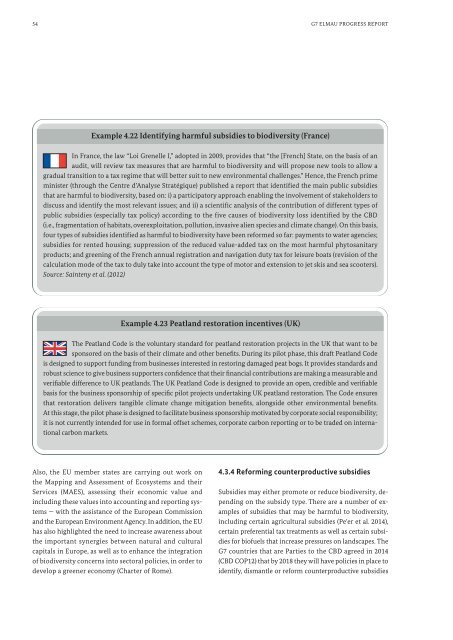G7-Elmau-Progress-Report-2015-Biodiversity-A-vital-foundation-for-sustainable-development
G7-Elmau-Progress-Report-2015-Biodiversity-A-vital-foundation-for-sustainable-development
G7-Elmau-Progress-Report-2015-Biodiversity-A-vital-foundation-for-sustainable-development
You also want an ePaper? Increase the reach of your titles
YUMPU automatically turns print PDFs into web optimized ePapers that Google loves.
54 <strong>G7</strong> ELMAU PROGRESS REPORTExample 4.22 Identifying harmful subsidies to biodiversity (France)In France, the law “Loi Grenelle I,” adopted in 2009, provides that “the [French] State, on the basis of anaudit, will review tax measures that are harmful to biodiversity and will propose new tools to allow agradual transition to a tax regime that will better suit to new environmental challenges.” Hence, the French primeminister (through the Centre d’Analyse Stratégique) published a report that identified the main public subsidiesthat are harmful to biodiversity, based on: i) a participatory approach enabling the involvement of stakeholders todiscuss and identify the most relevant issues; and ii) a scientific analysis of the contribution of different types ofpublic subsidies (especially tax policy) according to the five causes of biodiversity loss identified by the CBD(i.e., fragmentation of habitats, overexploitation, pollution, invasive alien species and climate change). On this basis,four types of subsidies identified as harmful to biodiversity have been re<strong>for</strong>med so far: payments to water agencies;subsidies <strong>for</strong> rented housing; suppression of the reduced value-added tax on the most harmful phytosanitaryproducts; and greening of the French annual registration and navigation duty tax <strong>for</strong> leisure boats (revision of thecalculation mode of the tax to duly take into account the type of motor and extension to jet skis and sea scooters).Source: Sainteny et al. (2012)Example 4.23 Peatland restoration incentives (UK)The Peatland Code is the voluntary standard <strong>for</strong> peatland restoration projects in the UK that want to besponsored on the basis of their climate and other benefits. During its pilot phase, this draft Peatland Codeis designed to support funding from businesses interested in restoring damaged peat bogs. It provides standards androbust science to give business supporters confidence that their financial contributions are making a measurable andverifiable difference to UK peatlands. The UK Peatland Code is designed to provide an open, credible and verifiablebasis <strong>for</strong> the business sponsorship of specific pilot projects undertaking UK peatland restoration. The Code ensuresthat restoration delivers tangible climate change mitigation benefits, alongside other environmental benefits.At this stage, the pilot phase is designed to facilitate business sponsorship motivated by corporate social responsibility;it is not currently intended <strong>for</strong> use in <strong>for</strong>mal offset schemes, corporate carbon reporting or to be traded on internationalcarbon markets.Also, the EU member states are carrying out work onthe Mapping and Assessment of Ecosystems and theirServices (MAES), assessing their economic value andincluding these values into accounting and reporting systems— with the assistance of the European Commissionand the European Environment Agency. In addition, the EUhas also highlighted the need to increase awareness aboutthe important synergies between natural and culturalcapitals in Europe, as well as to enhance the integrationof biodiversity concerns into sectoral policies, in order todevelop a greener economy (Charter of Rome).4.3.4 Re<strong>for</strong>ming counterproductive subsidiesSubsidies may either promote or reduce biodiversity, dependingon the subsidy type. There are a number of examplesof subsidies that may be harmful to biodiversity,including certain agricultural subsidies (Pe'er et al. 2014),certain preferential tax treatments as well as certain subsidies<strong>for</strong> biofuels that increase pressures on landscapes. The<strong>G7</strong> countries that are Parties to the CBD agreed in 2014(CBD COP12) that by 2018 they will have policies in place toidentify, dismantle or re<strong>for</strong>m counterproductive subsidies


